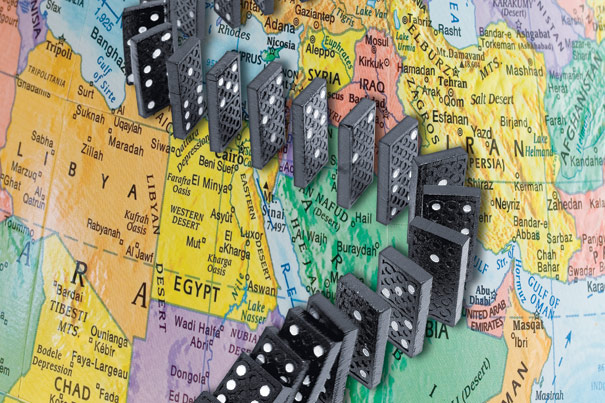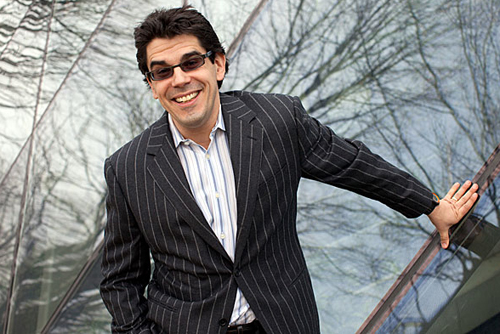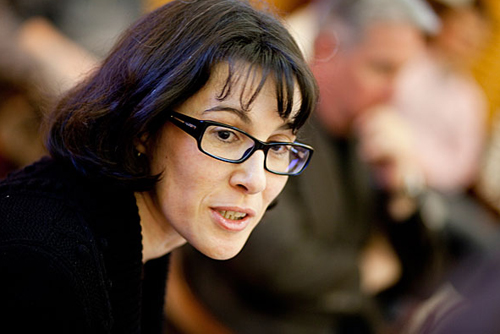
“We are witnessing a fundamental shift in the social and political conditions in much of the Arab world,” said Stephen Walt of the Belfer Center for Science and International Affairs at the Harvard Kennedy School. “The clock is not going to be turned back.”
Photo illustration by John Migliaccio/Harvard Staff
The tipping point
Harvard analysts look to the future of a changing Arab world
When Marshall Nannes began researching his master’s thesis on American military bases in Bahrain and Kuwait, he did something practically unknown. He actually asked the people in those countries how they felt about the U.S. presence there.
“All the research on the topic was at the government-to-government level,” said Nannes, a graduate student at Harvard’s Center for Middle Eastern Studies (CMES) who traveled to the two tiny Mideast nations in January for his research. The popular wisdom, he said, was that “it doesn’t really matter what the people — the opposition leaders — think.”
A scant two months later, Bahrain has been swept by turbulent demonstrations and a government crackdown. Bahraini opposition leaders, once just the subjects of Nannes’ obscure thesis, now are interviewed regularly in The New York Times. And Bahrain’s protesters are trumpeting their anger in the streets.
Political protests are sweeping the Arab world across a 2,000-mile crescent. The unrest began in December with one man’s self-immolation in Tunisia and spread like wildfire to Egypt, Libya, Bahrain, Syria, Yemen, and elsewhere, taking the international community by surprise. In a region that historically has appeared inhospitable to democracy, millions of ordinary citizens rose to demand basic political rights.
Responding to these shifts, Harvard analysts have been working overtime to parse the resultant economic, religious, political, and social changes. Taken together, their insights offer a fresh glimpse into the Arab world’s future. In a series of interviews, the Harvard specialists said it is time to shed outdated assumptions about the region: from the dictum that oil must be protected at all costs, to the fear that Islam guides the region’s worldview, to the fantasy that democracy can solve all of the area’s problems.
“Now is not the time to go in with rhetorical guns blazing, but to step back and think about what this means” for civil-military relations, democratization, and issues of religion and the state in the region, said Paul Beran, director of the CMES Outreach Center.
The results of the political unrest have ranged from the inspiring — President Hosni Mubarak’s relatively peaceful departure from power in Egypt — to the explosive, as in Libya, where an international military coalition began enforcing a no-fly zone last weekend against leader Moammar Gadhafi’s forces, as civil war raged through the land.
Among the key themes that Harvard analysts see emerging from the Arab unrest are these:
It’s not about oil
To much of the world, the Mideast and North Africa have long been defined by oil — and energy interests often define when and how the West responds to the region’s political crises. But whether the Arab world sustains its newfound democratic energy or slides back toward more authoritarian rule, oil won’t be to blame, according to one Harvard expert who studies the effects of political instability on energy markets.
It’s time to ditch the myth of the “resource curse,” or the popular theory that countries with an abundance of limited natural resources such as oil are more vulnerable to, among other ills, power-play politics and corruption.
“Sitting on a boatload of oil does not make you unstable,” said Noel Maurer, an associate professor of business administration at Harvard Business School (HBS).
In truth, oil production tends to stay up and running even in highly destructive wars. “It actually seems to be the case that the [oil] markets are completely resilient to political instability and violence going on around them. Those sectors are often the last man standing,” Maurer said.

The idea that lucrative oil resources make many Arab nations ripe for takeover by authoritarian leaders only leads to cynical — and misguided — foreign policy, Maurer said. The United States should support the Arab revolutions not just because they increase freedom for millions, but because democracies in the region would likely prove more stable for business than the autocracies that U.S. leaders have tacitly supported for years, he argued.
That said, observers are right to be concerned if continued fighting in the region cuts off the flow of oil, as has already happened in Libya.
“Oil markets right now are extremely tight,” Maurer said. “There’s not a lot of excess capacity around, so even small shocks could send prices up.” As rising industrial powers, China and India demand an ever-greater share of the world’s oil, and that is unlikely to change, he said.
While Libya produces much more oil, Bahrain, an island nation of just a million people, is “the real place to watch,” Maurer said. “Oil’s going to start flowing in again from Libya, either because the rebels will figure out how to continue production or Gadhafi will prevail, although the latter is unlikely now that the United Nations has intervened,” he said. But if unrest continues in Bahrain, fear of it spreading could send oil markets into short-term panic.
In addition, the Bahraini unrest and the resultant government crackdown have thrown a wrench into the relations between oil giant Saudi Arabia, which dispatched security forces to aid government forces, and the United States, which opposes any violent response.
The economy trumps religion
The uprisings in Tunisia, Egypt, and other Arab countries have surprised outsiders with their lack of religious rhetoric. The protests and resulting overthrow of Tunisia’s leader Zine el-Abidine Ben Ali and Egypt’s Mubarak have shown that the economy, not Islam, dominates everyday citizens’ concerns, according to Malika Zeghal, Prince Alwaleed Bin Talal Professor in Contemporary Islamic Thought and Life in Harvard’s Faculty of Arts and Sciences (FAS).
In Tunisians’ revolutionary rhetoric, “religion was simply absent because the Tunisian revolution was not about religion,” Zeghal said. “The protests were articulating a critique of the relationship between Tunisians and their state.”
That critique stemmed from deep economic crisis. In central Tunisia, unemployment among young people with college degrees is as high as 40 to 50 percent, according to Zeghal. Tunisians’ discontent over the lack of economic opportunities coalesced into anti-state protests targeting the regime’s corruption and its repression of political dissent.
Egyptians and Tunisians are now debating whether their revised constitutions should keep the notion of a state religion.
Both countries have legally authorized Islamist parties (Wasat in Egypt and al-Nahda in Tunisia) for the first time. Such religious parties will have to cross the same hurdles as secular ones, Zeghal said. Egyptian and Tunisian youth have high expectations that their new governments will increase economic opportunities and become accountable.
Even Muslim parties’ “ability to emerge politically in future elections will also depend on their capacity to find solutions to the deep socioeconomic crisis in these two countries, and to speak a political language that can inspire the youth,” she said.
Democracy isn’t enough
The Egyptian constitutional referendum held March 19 was certainly proof that major change has already resulted from the wave of protests. More than 14 million Egyptians turned out to vote in what was considered the first legitimate referendum in the country’s lengthy history.
But while this step toward democracy was a breakthrough for Egypt, that move alone won’t solve the underlying socioeconomic problems that sparked the protests. “There’s a stark contrast between the rich and the poor in these countries, and the disparity has been growing,” said Steven Caton, a professor of contemporary Arab studies in the FAS Anthropology Department.
For a case study on the limits of democratic participation, look no further than Yemen, an extremely poor nation. Caton, who has studied the country for 30 years, noted that Yemen has a longstanding democratic tradition. Despite the autocratic bent of the country’s ruling regime, Yemen has held several successful, internationally monitored elections for both its president and parliament. But the country has still been swept by revolutionary fervor. Support for President Ali Abdullah Saleh has plunged, amid violent protests and high-level government defections.
“They have a more-or-less democratic system that limps along,” Caton said. “What they don’t have, really, is an ability to address certain simmering, long-term complaints within their society.”
Yemen’s population has exploded in recent years, Caton said, and more people are moving to urban areas looking for work as the country’s agricultural system becomes overburdened. So Yemen’s city dwellers are also exposed to the regime’s corruption to a degree they never would have been had they remained in tribal society.
“The regime has allied itself to this oligarchy at the expense of an equitable distribution of resources to the rest of the population,” Caton said. “These protests are for political reforms, and they’re couched in the populist language of democracy. But they’re really about political reforms that will bring capital back [to the country] and redistribute capital.”
To create long-term stability in the region, Caton said, the United States must be prepared to contribute to economic development, not just to stable elections. American leaders, who have focused on Yemen mainly as a potential hotbed for al-Qaeda terrorist recruitment, need to invest in economic development projects to earn trust.
Social media matter — to a point
The temptation to overvalue the role of social media in bringing about democratic change has abated somewhat since Iran’s failed Green Revolution in 2009. Then, Iranian protesters took their frustrations with undemocratic elections to the world through Twitter, only to see their online voices muted as Iranian President Mahmoud Ahmadinejad tightened his grip on power.
When it comes to reporting on so-called social media revolutions in the Mideast and North Africa today, “the Western media’s a little more sophisticated than they were then,” said Rob Faris, research director of the Berkman Center for Internet & Society and a contributor to its Internet and Democracy Project.
How can outside observers know when to trust the Internet buzz coming from the region? The Internet and Democracy Project’s authoritative 2009 study, “Mapping the Arabic Blogosphere,” which the Berkman Center is now updating, shed light on how countries such as Egypt have fostered revolutionary chatter online in ways that Iran did not.

“In Iran you had a clearly divided blogosphere. You had pro-reform elements, and pro-theocracy elements,” Faris said. “That parallels in many ways the [two-party] structure of American politics. Egypt is completely different.” Not only are Egyptian opposition groups much less cohesive and more difficult to target online, he said, but a survey of the country’s blogosphere shows “it was missing a pro-Mubarak element.”
“We don’t know to what extent the blogosphere reflects offline life,” Faris said. “So far, everything we’ve seen is consistent with that.”
Still, even Faris, an Internet acolyte, cautioned that after the masses are mobilized, the web may prove useless in helping to build new institutions and hold them accountable. “It’s probably easier to bring down an autocrat than before,” Faris said. “But what that brings you after the revolution — I don’t think that’s changed much.”
Social media platforms such as Facebook and Twitter don’t appear to be as crucial to organizing protests as some might believe.
“You might put a Facebook page up to get people interested [in a protest], but chances are all the major organizing is happening on back channels,” said Jillian York, project coordinator for the OpenNet Initiative, an Internet monitoring group run in part out of the Berkman Center.
But cell phones do play a role. While wealthier nations such as Iran and the United Arab Emirates saw skyrocketing rates of Internet use over the past few years, the countries that have experienced recent unrest were experiencing an explosion in cell phone use, according to figures from the International Telecommunication Union.
With the new ability to communicate instantly, easily, and — most important — privately through cell phones and text messaging, “it’s become clear that mobile is an absolutely vital part of this movement,” York said.
Lessons for America
President Barack Obama’s decision to support a no-fly zone over Libya with U.S. warplanes marked a late but decisive entry into the region’s turmoil. Although the announced goal of the no-fly zone is to stop humanitarian abuses by Gadhafi’s forces, the move also signals tacit support for overthrowing the embattled leader. It was a controversial shift, according to Stephen Walt of the Belfer Center for Science and International Affairs at the Harvard Kennedy School. Backing the ouster of authoritarian leaders such as Gadhafi reflects the Obama administration’s desire to see the “Arab spring” of democratic change blossom.
“America’s interests in the region, both strategic and moral, have not changed at all,” said Walt, the Robert and Renée Belfer Professor of International Affairs and faculty chair of the International Security Program. “What’s changed are the political strategies we must use to try to advance those interests.”
He said the United States will have to get used to caring about public opinion in the Arab world, a metric that was easily ignored when American diplomats dealt primarily with authoritarian leaders not accountable to public opinion.
Despite Western fears that the region’s revolutions will leave a political vacuum that could be filled by extremist groups, Walt said the protests have most likely helped to slow the spread of radical Islamist ideas.
“One of al-Qaeda’s primary grievances was with this set of autocrats in the Arab world that they accused of being un-Islamic and in bed with the United States,” Walt said. “Al-Qaeda argued that the only way to deal with those governments was with violent extremism and terrorism. Instead, what we’ve seen is that peaceful protests accomplished far more to open up these societies than al-Qaeda ever did.”
There is some evidence that embracing international cooperation, as the Obama administration has done, has long-term positive benefits. A recent study of the world’s political systems over the past 200 years said that a country’s membership in international organizations such as the United Nations, the World Bank, or regional trade groups leads the state gradually to become more like its neighbors.
“States are more likely to experience positive changes in their level of democracy when they are tied to many other countries that are more democratic than they are,” said Magnus Thor Torfason, assistant professor of business administration at HBS and a co-author of the study. Tunisia and Egypt had strong ties to international groups. Even countries that are tied to other democracies through military alliances, as was Egypt, are historically more likely to accept democratic reform.
“If the United States wants to promote democracy, it should engage effectively with international organizations, but also support the engagement of other democracies,” Torfason said.
In other words, Torfason’s research suggests, democracy can be contagious — a theory borne out by the protests that have swept North Africa and the Mideast. Regardless of how the political turmoil plays out in individual nations, Harvard’s analysts agree, the region will have shed its reputation as a place seemingly immune to the popular desire for freedom.
“We are witnessing a fundamental shift in the social and political conditions in much of the Arab world,” Walt said. “The clock is not going to be turned back.”





